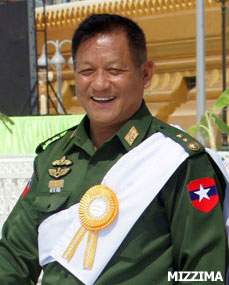New Delhi (Mizzima) – Candidates can start campaigning freely now for the by-election, Union Election Commission (UEC) chairman Tin Aye said on Friday. The date of the election has not been set, but it is expected to be about 90 days after the start of campaigning.
 A total of 48 seats at the union or regional level are open. Political parties are free to campaign without informing the EC of their plans, according to sources. There are some constituencies in which there may be no election due to fighting in ethnic areas.
A total of 48 seats at the union or regional level are open. Political parties are free to campaign without informing the EC of their plans, according to sources. There are some constituencies in which there may be no election due to fighting in ethnic areas.
EC chairman Tin Aye said this election would be free and fair. The commission will spend 700 million kyat (US$ 897,436) in comparison to nearly 1,100 million kyat (US$ 1.41 million) for the 2010 election, according to the EU announcement.
UEC member Myint Oo said an education campaign would begin on the procedure for absentee ballots and the regular voting process.
A local editor told Mizzima: “They admitted there were some weaknesses in the 2010 general election. They asked to let bygones be bygones and requested us not to revisit these issues again. They said that they would follow every law exactly to be free and fair in this election.”
The UEC allowed the re-registration of the National League for Democracy Party in December after screening and clearing the 21 members who signed the application to register. Currently, Burma has 37 registered political parties. Ten new parties have applied for registration.
The by-election race that will attract the most attention by far will be Aung San Suu Kyi’s candidacy for a seat in Parliament. She has not yet announced what constituency she will run in, but she will win by a landslide, observers say.
With Suu Kyi holding a Parliament seat, a stronger opposition alliance will emerge, including bills designed to move forward long-neglected issues such as labor rights, the ownership of farmland, the independence of the judicial system, a streamlining of the cumbersome government regulations and other issues. A question will be the willingness of the new government in accommodating the demands of a strengthened opposition alliance.
The most difficult issue confronting the government and the opposition political groups is the fighting in ethnic areas, although there have been a number of cease-fires signed in recent months.
The recent peace negotiations by the new government of President Thein Sein “mark one of the most significant moments in the six decades of conflict,” the think-tank International Crisis Group (ICG) said in a recent report, while adding that “lasting peace cannot be assured.”
Ethnic minority grievances go back to the days of Burma’s independence and the government must address the concerns of each distinct ethnic group, including those not pursuing an armed struggle.
In eastern Karen State, rebels have waged one of the world's longest insurgencies, and the region is now littered with landmines. There are around 150,000 refugees living in Thailand on the border.
Bloody fighting has also raged since June in northern Kachin State, where there is widespread resentment over Chinese-backed hydropower dam projects. Heavy fighting has continued daily in the state since November's peace talks.
On her landmark visit to the country last week, U.S. Secretary of State Hillary Clinton welcomed what she said were efforts by the regime to move toward democracy and national reconciliation, after talks with the country's rulers.
Throughout Clinton's visit – the first by such a high-level U.S. politician in 50 years – U.S. officials said they expected the ethnic fighting to be one of the most difficult issues to resolve.
Even though there has been progress on reforms, “terrible violence continues,” and ethnic nationality areas suffer from “unacceptably high rates of poverty, disease and illiteracy,” Clinton said.
Aung San Suu Kyi has put a priority on ethnic issues, calling for an immediate cessation to all fighting and open negotiations designed to promote national reconciliation.
A key question is how far the new government is willing to go in accommodating the ethnic minority groups’ desire for greater autonomy.


